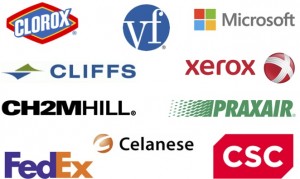How Different Fortune 500 Companies Define Responsibility
 Responsibility means different things to different people. This is also true for businesses – even multi-billion dollar companies.
Responsibility means different things to different people. This is also true for businesses – even multi-billion dollar companies.
Some look at it with an internal perspective, while others look at it with an external viewpoint. Some consider the focus is about people, while for others it’s all about profits. Some itemize specific details, while others keep it at a high level.
Just consider the different ways the following ten Fortune 500 companies define responsibility (ranking based on 2013 data):
- At Microsoft (#35), responsibility is linked to accountability. They define it as: accountable for commitments, results, and quality to customers, shareholders, partners, and employees.
- At FedEx (#63), responsibility is linked to the external environment. They define it as: we champion safe and healthy environments for the communities in which we live and work.
- At Xerox (#131), responsibility is simply defined as: we behave responsibly as a corporate citizen.
- At CSC (#176), an IT outsourcing and services company, responsibility is linked to results. They define it as: we accept individual responsibility for our commitments and expect to be accountable for results.
- At Praxair (#241), a provider of industrial gases, they call it “Environmental and Social Responsibility.” They define this as: helping customers worldwide improve their environmental performance and carbon footprint, while minimizing our own environmental resource intensity and maximizing our social and community contributions.
- At VF (#250), a company with a number of brands in apparel and footwear, it’s defined as: responsibly managing the industry’s most efficient supply chain.
- At Celanese (#396), a technology and chemicals company, they combine responsibility with safety and integrity. They define it as: commitment to the highest standards of safety, personal conduct and business integrity around the world.
- At CH2M Hill (#415), an engineering and construction company, they refer to responsibility as “Employee Control”, which they define as: responsible financial management providing long-term company stability and agility to invest/grow where we choose.
- At Cliffs Natural Resources (#424), a producer of iron ore and coal, they highlight both “Group and Individual Accountability.” They define this as: behaving in line with our core values… being responsible for our actions… providing plans/standards/expectations… holding yourself and/or the group to a high standard of performance… and walk the talk.
- At Clorox (#461), a maker of numerous consumer brands, they refer to it as Taking Personal Ownership and link it directly to results. They further clarify this by stating: each of us plays an important role in helping ensure we deliver excellent results and achieve our goals.
With such varied descriptions, how does a company use responsibility to create competitive advantage?
As a differentiating value, Responsibility means duty or obligation to perform or complete a task; accountable for one’s behavior. So…. if the competitive landscape is littered with companies that find it challenging to complete their duties, meet their obligations, or to even take ownership for their behavior, then it’s a great opportunity for some company to embrace the value of responsibility.
In other words, if being responsible – no matter the cost – is part of your organization’s DNA and culture, and your competitors are lacking in this area, then the field is wide open to make responsibility a key differentiator.
What does responsibility mean to you and your organization?
Today’s value was selected from the “Harmony-Order” category, based on the e-book Developing Your Differentiating Values.







